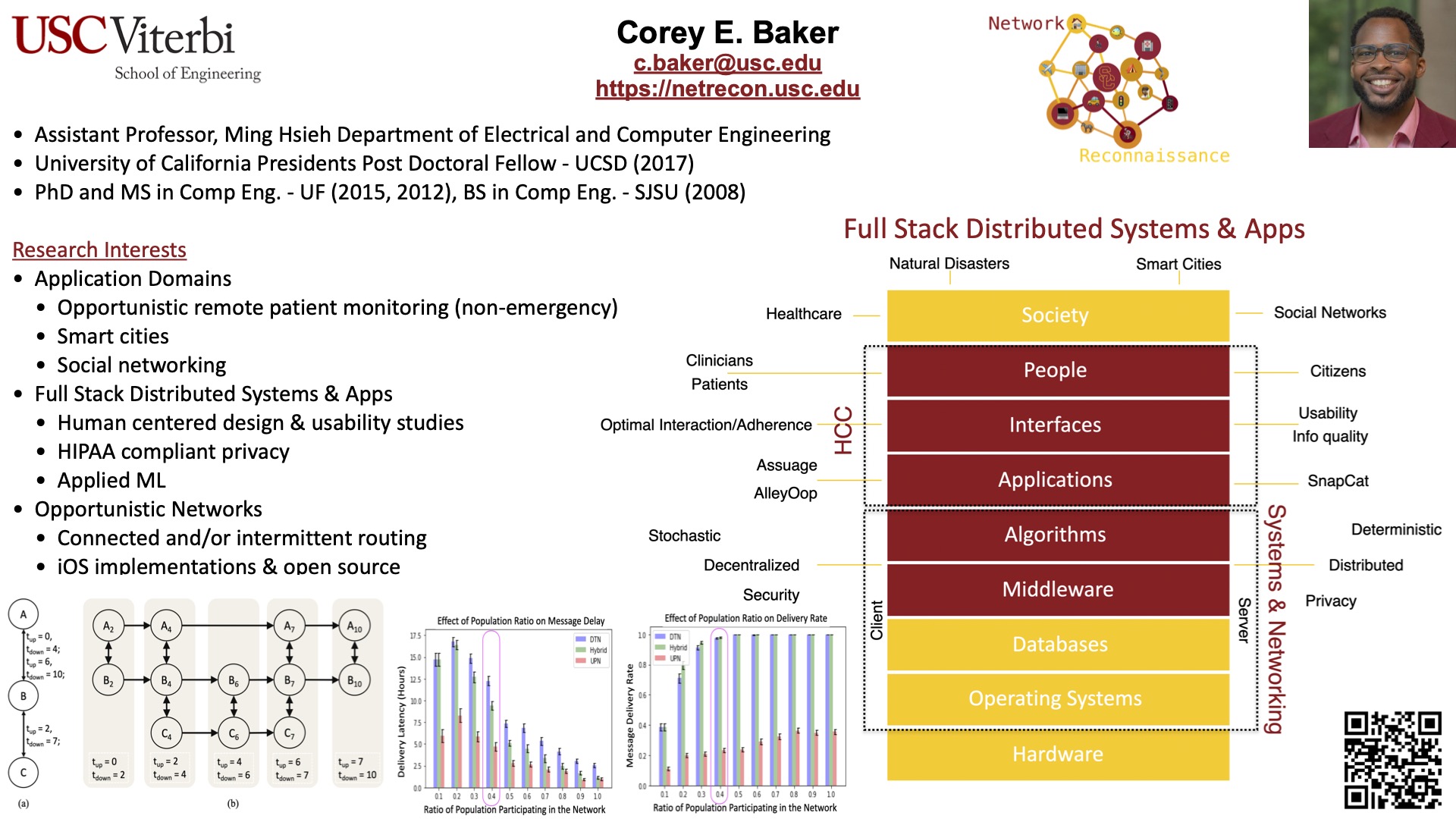
Corey E. Baker
Assistant Professor of Electrical and Computer Engineering and Computer Science
Education
- 2015, Doctoral Degree, University of Florida
- 2012, Master's Degree, University of Florida
- 2010, Master's Degree, California State University - Los Angeles
- 2008, Bachelor's Degree, San Jose State University
Biography
Corey E. Baker is an Assistant Professor in the Ming Hsieh Department of Electrical and Computer Engineering in the Viterbi School of Engineering and the School of Advanced Computing at the University of Southern California (USC). Baker is a former Application and Framework Engineer in Health and Research Products at Apple Inc where he worked on medical and research frameworks such as CareKit and ResearchKit. Before joining USC, Corey was an Assistant Professor in the Department of Computer Science at the University of Kentucky (UK). In 2019, Baker received the UK Inclusive Excellence Award for his work in creating a graduate campus visit program and diversifying Computer Science and Engineering at the doctoral level. Corey's work has been highlighted by NBC News and Spectrum News.Baker received a B.S. degree in Computer Engineering from San Jose State University (SJSU), a M.S. in Electrical and Computer Engineering from California State University, Los Angeles (CSULA), and M.S. and Ph.D. degrees in Computer Engineering from the University of Florida (UF) under the supervision of Professor Janise McNair. After completion of his graduate studies, Baker was a University of California Presidents Postdoctoral Fellow in the Qualcomm Institute at the University of California San Diego under the mentorship of Tara Javidi and Ramesh Rao. Baker has also served as the Travel Grants Chair for ACM CoNext 2024 and ACM HotMobile 2020, and participated on the TPC's of numerous IEEE conferences.
Research Summary
I am the Director of the Network Reconnaissance Lab (NetRecon) which investigates full stack systems for distributing, protecting, and authenticating data in opportunistic networking scenarios for remote patient monitoring, smart cities, and natural disasters to improve the livelihood of people. I evaluate real-world applications of opportunistic delay tolerant networks (DTNs) and human centered computing to empower device-to-device (D2D) social networks for crowd sourcing information. Leveraging opportunistic communication provides complementary solutions to traditional networks which are typically dependent upon centralized infrastructures such as the Internet. The goal of my research is to make critical data accessible to vulnerable communities in the midst of intermittent and poor connectivity while minimizing delay.Resilient networking technology that facilitates the flow of information can be deployed in resource-deprived environments and play an instrumental role in disseminating data that can save lives. Reliance on Internet connectivity is detrimental when modern networking technology is unavailable, power outages are frequent, or network connectivity is sparse or non-existent (i.e., rural environments, natural disasters, and developing countries). My current research provides systems and frameworks for building domain specific mobile applications for routing information in vivo to dynamically create delay tolerant online/offline networks.

Awards
- 2019 University of Kentucky Inclusive Excellence Award
- 2015 Florida Education Fund McKnight William R. Jones Most Valuable Mentor Award
- 2015 University of California Presidents Postdoctoral Fellowship (UC San Diego)
- 2014 Florida Education Fund McKnight Dissertation Fellow
- 2010 The National GEM Consortium Ph.D Fellowship (Intel Corporation)
- 2008 National Science Foundation LSAMP Bridge to Doctorate Fellowship
Appointments
Social Media
- Ming Hsieh Department of Electrical and Computer Engineering
- Thomas Lord Department of Computer Science
- EEB 342
- Hughes Aircraft Electrical Engineering Center
- 3740 McClintock Ave., Los Angeles, CA 90089
- USC Mail Code: 2563
- (213) 821-0415
- c.baker@usc.edu


